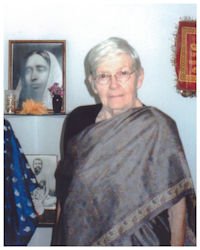Pioneer Women of Vedanta - Dr. Leta Jane Lewis
1918-2009
Dr. Leta Jane Lewis
Dr. Leta Jane Lewis (1918-2009) was a student of Vedanta philosophy for over fifty years. A university professor with specialization in German. Professor Lewis met her spiritual teacher in 1951 and became a disciple of Swami Prabhavananda, the longtime head of the Vedanta Society of Southern California. She was highly regarded as a teacher, mentor, writer, and speaker. She introduced Vedanta philosophy to many.
In her book, The Ultimate Love Affair: Vedanta and the Search for God, Dr. Lewis explains the fundamentals of Vedanta. She also introduces the classic Indian scriptures. The provocative title of her book is derived from a Sufi parable in which a lover is not admitted into his sweetheart's chamber until he fully identifies himself with her. The spiritual search for complete identification with the Beloved Lord or Mother is comparable to human love and longing.
"A lover knocked on his sweetheart's door. 'Who is it?' she called. He answered, 'It is I.' The door remained closed, so he knocked again. 'Who is it?' 'It is your lover.' Since the door still did not open, he knocked a third time. 'Who is it?' 'It is thyself.' The door opened at once." Adapted from Sufi mysticism.
Through her compassion and human understanding, Dr. Lewis introduced Vedanta and the swami teachers of the Ramakrishna Order to many of her students. She writes in The Ultimate Love Affair (page 165):
The average spiritual seeker begins his spiritual life groping alone in the dark. But if he is sincere, a little light will eventually appear to guide him. Somewhere, somehow, perhaps in a church, a temple, or a mosque, at home or on the job, a glimpse of spiritual light will come to him. Then his deepening prayer will be for light, more light, and if he persists, this prayer for greater inspiration is sure to be answered. Perhaps a guide who has already taken the path ahead of him and knows the dangers will come to give him a hand up rocky inclines and a push back onto the path when he strays.
Her inspiring talks at the Vedanta Society of Sacramento, California were folksy, humorous, and personal. She shared herself fully and embodied the ideals in which she believed. “Before she passed, she gave a lecture on "Why I am a Vedantist".
....Because they believe in reincarnation and the divinity of man, Vedantists do not need to use the word 'salvation' to refer to the afterlife. Whatever their present state of confusion, all human beings, good or evil, have the same divine destiny, the eventual realization that the true Self is divine Existence, Consciousness, and Bliss.
This is where reincarnation comes in. Unlike Christians, Vedantists don't expect to experience the Ultimate immediately after death. Although everyone has been assured of reaching the superconscious state, it rarely happens overnight. We are all involved in an evolutionary process, which takes us through incarnation after incarnation, through countless struggles and learning experiences, until a ray of light miraculously comes. It comes as a gentle sweetness, which is none other than a vague preliminary experience of one's highest Self. It gradually intensifies until finally, we become aware of ourselves as divine Existence, Consciousness, and Bliss.




